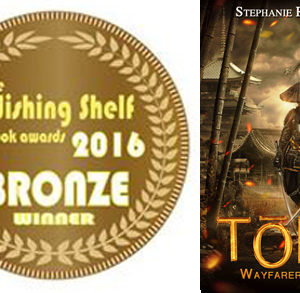We’re grateful to The Avid Reader for hosting this Author Interview and Excerpt from “Toru: Wayfarer Returns” where we discuss why Toru is such a stiff and Jiro is so much fun. Check out the post on The Avid Reader here, or read it below!

Excerpt:
“Rather than argue with them, you should invite them to make the first flight with you,” said Takamori. “At first they will agree, since it is their place as the leaders. Everyone is very excited about the dirigibles. Set the time and place for the first flight. Jiro should explain that is not a good time because of the wind or something technical that needs testing first. You argue with Jiro and perhaps even scold him for impertinence in front of thedaimyōs.”
“Yes, I am often scolded for impertinence,” said Jiro. “I have a talent for it, you know.”
“Indeed you do,” said Tōru. He saw where Takamori was going. “Then they notice the risks and uncertainties…and they ask me if it is safe. I tell them honestly that we have no idea if it is safe or if it will work, and that we might all crash to a fiery death and therefore perhaps I should test it first myself before we endanger them.”
“And I will be impertinent again and tell you in front of them that you don’t have a clue how to fly one of thesedirijibi!” Jiro finished the plan for them. “Which is also true, by the way. I know how to fly one of these, and you don’t.”
“You’ve never flown one either,” protested Tōru.
“I have built one. Almost. Soon. How many have you built?” asked Jiro, with his broad grin.
Tōru opened his mouth and closed it again.
“See? Problem solved,” said Takamori, as he pounded Tōru on the back. “We have a fine dirijibi pilot, the finestdirijibi pilot in all of Japan, our good man Jiro here.”
Interview with Stephanie R. Sorensen
Have you ever had an imaginary friend?
No, not exactly. The closest I came was a friend who had an imaginary friend. We were very small, maybe six or seven years old, and she didn’t roll without her friend Emily, who was invisible to the rest of us. We had to make room for Emily in the car pool and ask her preferences when making plans. Emily got us into trouble a couple of times, like when she wanted us to swim in the lake we weren’t allowed to swim in unless adults were around, or the time she wanted to make perfume so we had to tear all the roses off the rose bushes in my friend’s mother’s garden and smash the flowers to get the rose oil for the perfume. My friend moved away and I missed her and missed having a good excuse for doing outrageous things like smashing all the roses without Emily’s help.
I do have a motto for this situation. “Reality is for those who lack imagination.”
Do you have any phobias?
No, but I spend way too much energy hiding my appalled reactions to other people’s horrible statements or actions. You could say I have a phobia about expressing what I really think, lest I offend. An ingrained habit of politeness prevents me from speaking more freely, and that perhaps drives my desire to write fiction. I’m going to create some evil and outspoken characters in future books, and revel in the doing. I feel it coming on. Soon.
Do you listen to music when you’re writing?
Yes. Classical music or Celtic or Scandinavian metal goth, something full of motion and liveliness for cranking out first drafts. Editing requires silence, for I have to try out different options in my head without them being carried along by a musical flow that distorts my understanding of them.
Do you ever read your stories out loud?
Every word, once I am in final edits, while I pace in circles. I have to hear it aloud to know if it is working.
Tell us about your main character and who inspired him/her.
Let me back up to where the story came from, and how that got me to the character.
I originally wanted to write a steampunk story, something lively and fun and adventurous like Cherie Priest’s Boneshaker series. But she’d already done the Civil War period, and the Brits had done Victorian England. To death. Over and over again. What to do?! So, thinking about ways to freshen things up, I thought about Japan, where I had lived, studied and worked for several years. The concept of “Japan plus early steam = defeat the West” struck me as quite steampunk and a fun alternate history to explore.
I went looking for a hero and found the true story of Manjiro, a ship’s cook who had been rescued by Americans and taken to America where he lived for eight or nine years in the 1840s. Eventually he missed his mother and found his way back to Japan. This was forbidden, on pain of death, for anyone to leave Japan and return, so he should have been executed by the Shogun. But the Japanese government was really nervous by then about the foreign threat, and decided to milk poor Manjiro for all the intelligence he could provide about the West. Manjiro was made a samurai, and served the Shogun in some capacity when Commodore Perry came, helping to interpret the Americans’ behavior and speech.
*SPOILER ALERT* Tōru’s story follows much of Manjiro’s tale, but I sparkled Tōru up a bit, making him quite talented and giving him a fancier lord for a father and a (possibly) shapeshifter mother in contrast to Manjiro, who was an illiterate fisherman and, as some of the less polite history books assert, not very bright or insightful about his experiences in America.
This brought me to the point where I could create Tōru’s character. One part of Tōru is formed by the circumstances of his birth. *SPOILER ALERT* He is a bastard, an illegitimate son of a great father and a mysterious mother, raised in humble circumstances but exposed to great wealth and power, and superbly educated. He belongs to neither world, not the small safe village of his mother, nor the great castle of his lord father, where his father’s wife makes sure he knows his inferior station. Imagine how that would shape your soul, to be so close to greatness as your society defines it, but denied direct access. (Jon Snow, anyone?) And yet, in your desire to please a father who does care for you and interacts in nurturing ways with you, you would give anything, do anything to win that father’s approval, even risk your life, not once, but over and over again. Now amp it up, and you are sworn by that father not to reveal the relationship, not to rely on that father and his power, but single-handedly attempt to save your country. Imagine the loneliness, the pressure, the mingled pride and longing and alienation of that young man, with so much weighing down on him.
So Tōru isn’t carefree and fun-loving like his blacksmith friend Jiro, or even his low-ranked samurai friend Saigo Takamori, both of whom may be humble but are comfortable in their places in the world. He’s majime (“serious,” “earnest”) and dutiful, which yes, is one stereotype of Japanese, but it comes out of who he is and his role and his upbringing. The weight of the world rests on him, and has since his birth. I then layered onto this inner soul the personality of Japanese young men I had known well once upon a time, young men who were very serious and dutiful, remembering how they moved, studied, ate, drank, spoke and fell in love. And that is where Tōru comes from. He’s not flashy or charismatic or fun-loving. He embodies qualities of duty and self-sacrifice which are hard to make sexy in a world that values more flash. But I love him for his courage, his steadfastness, his heart, his compassion and empathy for the lesser born people he grew up with in his mother’s village. I hope readers will set aside their preferences for a more Western and charismatic hero and appreciate Tōru as he is in his Japaneseness and in the character formed by the circumstances of his upbringing.






Recent Comments